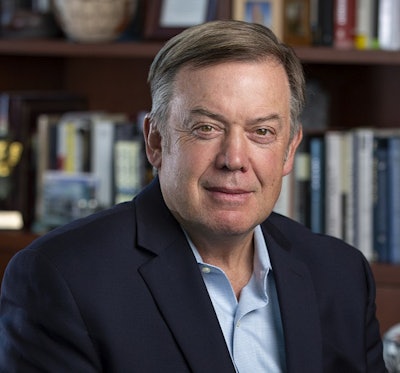The murder of George Floyd by the police in Minneapolis and the outrage from not just the Black community but communities throughout the entire country have created an energetic moment for universities to do some serious transformations.
For too long, we’ve been satisfied with “not being racist.” We haven’t been focused on crushing racism. We are going back now and looking intently at everything we do. We’re rethinking how we’re structured and having conversations about how we are organized, how we make decisions.
Why is it that faculty search committees of three or four faculty members consistently don’t find ways to select people from diverse backgrounds? What is it about the way the institution works that continues the problem? We’re asking those questions here, and we all need to be asking those questions.
 Dr. Michael Crow
Dr. Michael CrowWe’re looking back at why it is that we have been racially insensitive and have allowed racism to be pervasive at times within our own institution. It’s about facing it and looking at it square in the face.
We all need to understand that unless there are corrections and maturation and further movement, we will not realize our goal of equality and justice. And unless we can do that at the universities themselves, we won’t be able to do that anywhere.
There is a significant piece of work underway right now to modernize, to update and to address the weaknesses inherent in our own institutions. This will not be easy, and it will not be a quick fix. It will not be driven by one person or one group or one office. It must be pursued and challenged and felt throughout every aspect of the university.
We must commit to accelerate meaningful change. This is only a starting point, and we realize that, but the conversation is finally underway.
We have established a new Advisory Council on African American Affairs to help evaluate and develop possible ways to overcome systemic racism and injustice.
We are placing a heightened focus on the success and growth of our Black faculty, staff and students. We will establish a Presidential Postdoctoral Fellowship Program, funding at least 30 postdoctoral fellowships from underrepresented communities over the next two years who likely will continue on into a tenure-track position. We will create a new class of graduate fellowships for Black students and other students of color.
We also will establish graduate assistantships for underrepresented students to go to graduate school and will support the addition of 50 new graduate assistantships over the next two to three years.
We will hold town halls, including a deeper discussion about why we are embarking on this effort now. And we will look back, supporting ASU law professor Victoria Sahani, as she undertakes a historical study of race and discrimination at our own university. Are there things in the history, design or structural configuration of this institution that have kept us from attaining some of our objectives? The answer most certainly will be yes. We will identify them, and we will change them.
We will establish a multicultural space on campus, establishing and funding a working group to begin design options. We will look at more cluster hiring around leading faculty members from underrepresented groups to deepen our expertise and will recruit more underrepresented faculty with a commitment to 10 positions this year, continuing in subsequent years.
We can do more. We will do more. We must continue to acknowledge and dismantle the barriers of systemic racism in the ongoing design and evolution of our New American University, and on all university campuses.
We will work harder, invest more and do more to ensure that Black students, faculty and staff — and other underrepresented groups and individuals — are provided an educational, work and living environment that is welcoming, supportive and empowering to their success.
Dr. Michael M. Crow is president of Arizona State University.
This article originally appeared in the February 18, 2021 edition of Diverse. Read it here.















